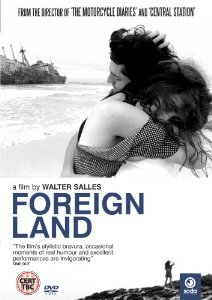| Foreign Land | |
|---|---|
 DVD cover | |
| Directed by | Walter Salles Daniela Thomas |
| Written by | Marcos Bernstein Millor Fernandes Walter Salles Daniela Thomas |
| Starring | Alberto Alexandre |
| Cinematography | Walter Carvalho |
| Edited by | Felipe Lacerda Walter Salles |
Release date |
|
Running time | 100 minutes |
| Country | Brazil |
| Language | Portuguese |
Foreign Land (Portuguese : Terra Estrangeira) is a 1995 Brazilian action film directed by Walter Salles and Daniela Thomas. [1]
Contents
In 2015, the Brazilian Film Critics Association aka Abraccine voted Foreign Land the 47th greatest Brazilian film of all time, in its list of the 100 best Brazilian films. [2]